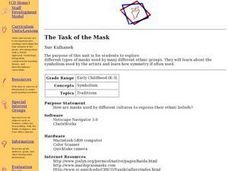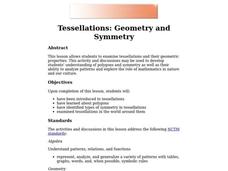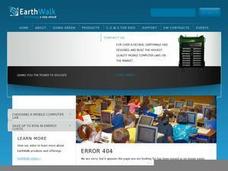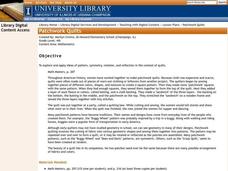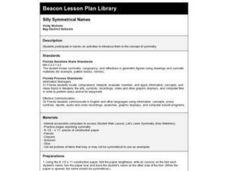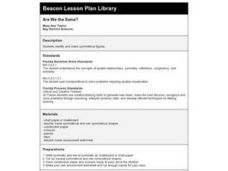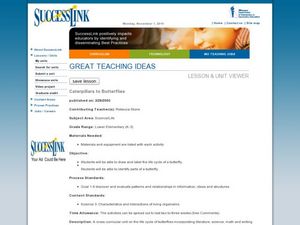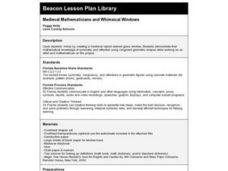Curated OER
Anamorphosis
Students classify optical illusions according to their distinguishing characteristics. They create anamorphic art and use Mylar flexible mirrors to view and then they describe and analyze the optical illusion.
Curated OER
The Task of the Mask
Students discover historical value and use of different African masks through research and literature. Students also relate different customs and traditions of ethnic groups to the masks.
Curated OER
Tessellations: Geometry and Symmetry
Students examine tesselllations and their geometric properties. They have a better knowledge of polygons, can identify types of symmetry in tessellations. Also students use visulization, spatial reasoning, and geometric modeling to...
Curated OER
Rainy Day Watercolor
Second graders create a street scene using street pictures for reference. students explore symmetry using watercolors. Students use art mediums to explore the mathematical concept of symmetry.
Curated OER
Mathematics in Art?
Fifth graders view prints of M.C. Escher's work. They look at examples of geometric figures and polygons and discuss places they have seen them. Students create their own tessellations. They write a report about the process they used in...
Curated OER
Science: Suddenly Snow
Students engage in snow-related activities during the first winter snowfall. After explaining the elements needed for it to snow, they preserve snowflakes on frozen slides and observe them under a microscope. Then, they write diamante...
Curated OER
Tightrope Trials
Students research the concepts of center of mass and how to make different things balance. They make symmetrical cut-outs of different "creatures" and experiment with how they balance on a tightrope of string.
Curated OER
Light Is Amazing
Young scholars investigate light and its energy. They discuss the properties of light, research how much light the moon absorbed on their birthday on a website, complete a graphic organizer, and create a kaleidoscope.
Curated OER
Symmetry Project
Students explore the concept of symmetry by drawing an the other half of an object. They pick from a stack of magazine pictures and draw it on another piece of paper.
Curated OER
Symmetry
Students make a design with pattern blocks and then pass them on to the rest of the class. They have to make them symmetrical and complete the design.
Curated OER
Side by Side: Butterfly Wings and Symmetry
Pupils observe butterfly images and then draw and paint their own design. They use this activity to explain symmetry.
Curated OER
Seeing Double
Students develop an intuitive definition for symmetry after viewing a PBS video. They examine asymmetrical patterns and demonstrate their knowledge by changing them to symmytrical.
Curated OER
Patchwork Quilts
Fourth graders examine about traditional quilting patterns, the symmetry in such patterns, and practice creating patterns of their own. They design a quilting pattern, and groups make colorful "patches," of a pattern. They assemble the...
Curated OER
Everything You Wanted to Know About Symmetry
Second graders, in groups, rotate through four workstations that reinforce the concept of symmetry. They spend about fifteen minutes at each workstation.
Curated OER
Silly Symmetrical Names
Fourth graders participate in hands-on activities to introduce them to the concept of symmetry. They make a silly symmetrical picture out of their names after gluing them onto a larger sheet of construction paper. This is a really...
Curated OER
Whatever Floats Your Boat
Second graders make boats by folding paper. They identify and draw shapes made during the creating process and place lines of symmetry on them. They demonstrate their understanding by completing an activity sheet imbedded in this plan.
Curated OER
Symmetry Collage
First graders, in groups, studying symmetry, compose collages and bulletin boards.
Curated OER
Are We the Same?
Students define and discuss symmetry, line of symmetry, and congruency. They cut shapes out of construction paper, identify the line of symmetry, and if they are symmetrical and/or congruent.
Curated OER
Geo Jammin' By DeSign - Day 3, Lesson 15: The Quiltmaker's Gift
Students listen to a read aloud of The Quiltmaker's Gift by Jeff Brumbeau finding examples of symmetry in the illustrations in the book.
Curated OER
Geo Jammin' By DeSign - Day 3, Lesson 16: The ABC of Symmetry
Students follow directions in the ABC of Symmetry to make a butterfly which shows a line of symmetry.
Curated OER
The Geometry of Indigenous Art
Learners examine the concepts of symmetry, rotations, reflections, translation, dialations, and tessellations and apply them to indigenous art. They also do Internet research and create artwork (painting, pottery, computer graphic design).
Curated OER
"Caterpillars to Butterflies"
Students participate in a variety of activities about how caterpillers become butterflies.
Curated OER
Medieval Mathematicians and Whimsical Windows
Third graders demonstrate their mathematical knowledge of symmetry and reflection using congruent geometric shapes while working as an artist and mathematician looking at a medieval-styled stained glass window.
Curated OER
Lines of Symmetry
Fourth graders demonstrate lines of symmetry using polygons, pentominoes, and block letters of the alphabet. They describe, identify, and analyze characteristics and properties of geometric shapes.



